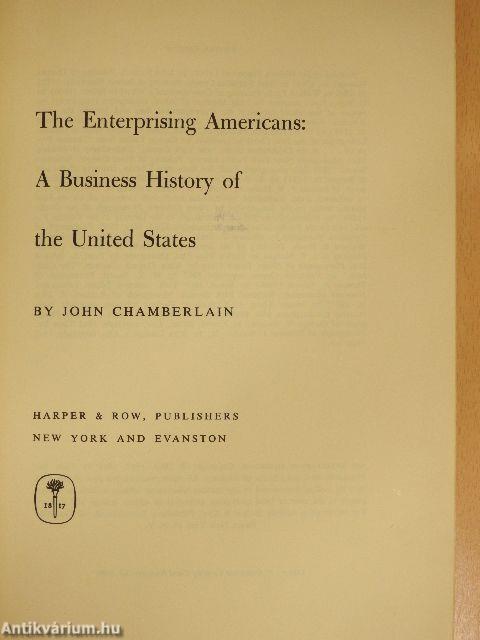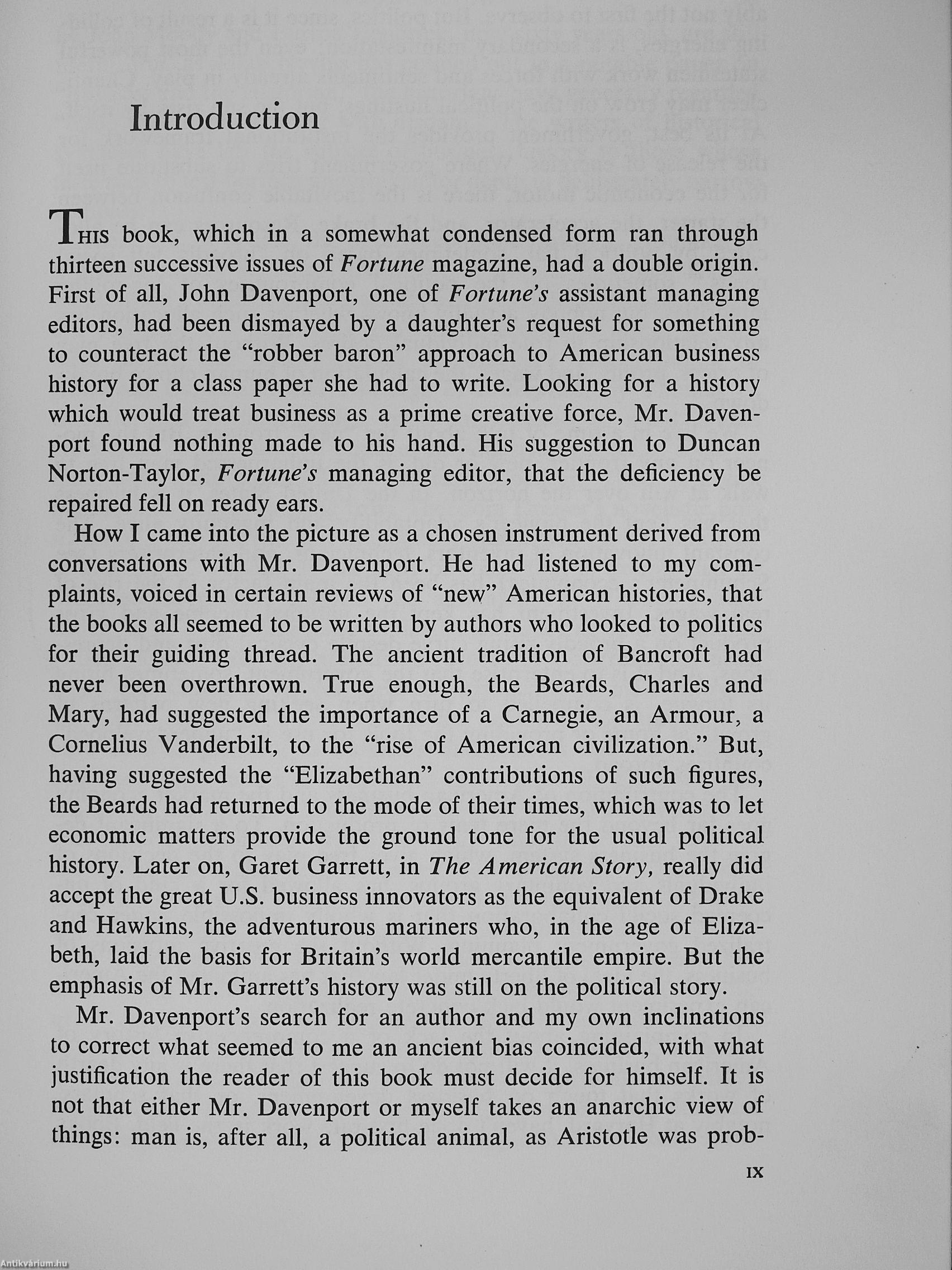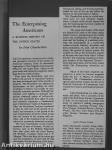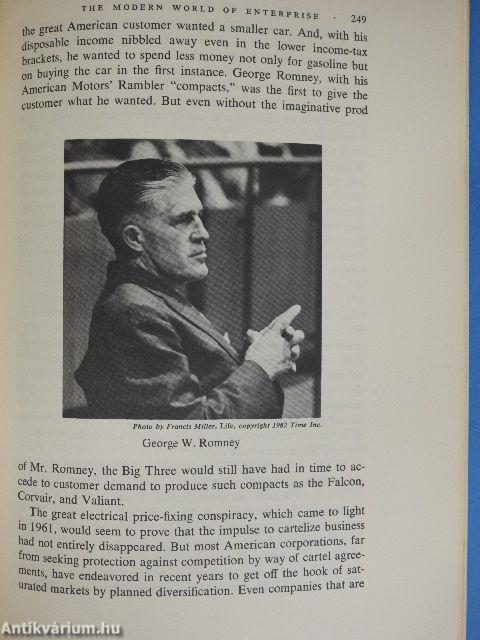1.067.894
kiadvánnyal nyújtjuk Magyarország legnagyobb antikvár könyv-kínálatát

VISSZA
A TETEJÉRE
JAVASLATOKÉszre-
vételek
The Enterprising Americans: A Business History of the United States
| Kiadó: | Harper & Row, Publishers |
|---|---|
| Kiadás helye: | New York-Evanston |
| Kiadás éve: | |
| Kötés típusa: | Vászon |
| Oldalszám: | 282 oldal |
| Sorozatcím: | |
| Kötetszám: | |
| Nyelv: | Angol |
| Méret: | 24 cm x 16 cm |
| ISBN: | |
| Megjegyzés: | Fekete-fehér fotókkal. |
naponta értesítjük a beérkező friss
kiadványokról
naponta értesítjük a beérkező friss
kiadványokról
Előszó
TovábbFülszöveg
The Enterprising Americans
A BUSINESS HISTORY OF THE UNITED STATES
by John Chamberlain
The Enterprising Americans is a lively and perceptive account of the growth of American business, from its mercantile beginnings in New England and along the Delaware and James River valleys to the great trade and industrial complexes which span the free world of today.
Ever since the Revolution, and even before, the growth of American business has been an integral part of the growth of America. The Revolution was sparked by businessmen: in fact, perhaps no other revolution in history was fought on such basically economic grounds. Although the colonists were fighting to maintain their ancient chartered grants of setf-govern-ment, they considered their rights to trade and economic expansion a fundamental part of the historic "rights of Englishmen." After the Revolution, business continued to play its vital role in the growth of industry and invention, in the spread of the vast transportation... Tovább
Fülszöveg
The Enterprising Americans
A BUSINESS HISTORY OF THE UNITED STATES
by John Chamberlain
The Enterprising Americans is a lively and perceptive account of the growth of American business, from its mercantile beginnings in New England and along the Delaware and James River valleys to the great trade and industrial complexes which span the free world of today.
Ever since the Revolution, and even before, the growth of American business has been an integral part of the growth of America. The Revolution was sparked by businessmen: in fact, perhaps no other revolution in history was fought on such basically economic grounds. Although the colonists were fighting to maintain their ancient chartered grants of setf-govern-ment, they considered their rights to trade and economic expansion a fundamental part of the historic "rights of Englishmen." After the Revolution, business continued to play its vital role in the growth of industry and invention, in the spread of the vast transportation networks which would link one section of the country with another, and in the transition from an agricultural to a primarily industrial economy.
The story concentrates on the creative moments of men of decision. Virtual unknowns such as Sir William Pepperrell take their place with the more famous Eli Whitney, Carnegie, Ford, and J. P. Morgan. This is the story of the cotton gin and the locomotive, of steel and oil and electronics. It is also the story of the American dream, of the poor young man who,
through wit, daring, and Yankee ingenuity, makes his way to the top and leaves his imprint on the generations to follow.
Mr. Chamberlain writes in a brisk anecdotal style, yet with scholarly insight, about a subject which should interest not only the businessman but every student of American life and history.
The scope and vitality of the book are indicated by some of the many topics which it covers: privateering in the coastal towns; the establishment of banking systems and the funding of a national economy; the development of a world-wide system of trade; industry, invention, and mass production; oil, steel, and the early trusts; the growth of money power; the creative as well as the destructive aspects of the men who have been called "robber barons"; the surprising expansion of business frontiers in the depressed Thirties—-these and many others are the lively events which The Enterprising Americans recounts.
Much of this book originally appeared as a series in Fortune magazine under the title "A History of American Business." Mr. Chamberlain received a special achievement citation for the series from the University of Connecticut Loeb Awards for business and financial journalism.
John Chamberlain is a critic, journalist, and editor, who is currently on the staff of the Wall Street Journal. A graduate of Yale, he has long been associated with many of America's leading newspapers and magazines, including Fortune, Life, The Freeman, National Review, Barron's Weekly, The New York Times, The Saturday Review, Scribners and Harper's Magazine.
Jacket Picture Credits
Jacket photographs courtesy Ewing Galloway. Early stock market scene courtesy The Bettman Archive. Drawing of a cotton gin, used in Mitchell Wilson, American Science and Invention (Simon and Schuster), and in P. G. Hubert, Men of Achievement: Inventors (Charles Scribner's Sons). All other pictures courtesy the New York Public Library. Vissza
Témakörök
- Közgazdaságtan > Gazdaságpolitika
- Közgazdaságtan > Közgazdasági elméletek > Tőkés országok gazdasága
- Közgazdaságtan > Gazdaságtörténet > Tanulmányok
- Idegennyelv > Idegennyelvű könyvek > Angol > Közgazdaságtan > Gazdaságpolitika
- Idegennyelv > Idegennyelvű könyvek > Angol > Közgazdaságtan > Közgazdasági elméletek > Tőkés országok gazdasága
- Idegennyelv > Idegennyelvű könyvek > Angol > Közgazdaságtan > Gazdaságtörténet > Tanulmányok















